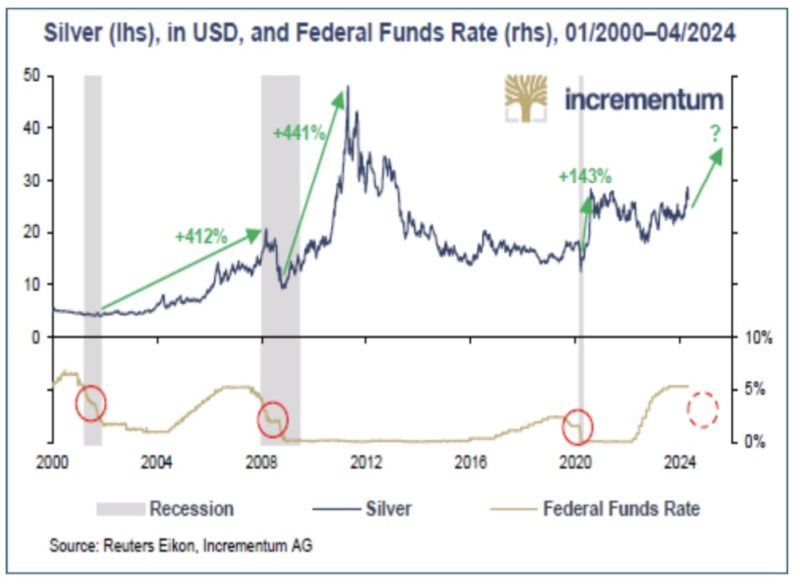Tag Archive: Monetary
Predictions vs. Convictions
Share this article
Separating the signal from the noise
Most regular readers and friends will undoubtedly already know what my position is in regards to projections and forecasts. For many years, I have consistently maintained that any and all attempts to “time the market” are as useless as they are unrealistic and I have always urged all responsible and rational investors to be extremely wary and suspicious of anyone that claims they can...
Read More »
Read More »
Swissgrams: the natural progression of the Krugerrand in the digital age
Share this article
Having worked in the precious metals industry for decades, I have had countless opportunities to have very honest and very enlightening conversations with numerous investors and partners alike. For many years, I’ve been discussing the challenges, the hurdles and the problems they’ve encountered. The details of each story I’ve heard might be as unique as the person who shared it with me, however, most of these accounts have a...
Read More »
Read More »
Swissgrams: the natural progression of the Krugerrand in the digital age
Having worked in the precious metals industry for decades, I have had countless opportunities to have very honest and very enlightening conversations with numerous investors and partners alike. For many years, I’ve been discussing the challenges, the hurdles and the problems they’ve encountered. The details of each story I’ve heard might be as unique as the person who shared it with me, however, most of these accounts have a common denominator....
Read More »
Read More »
Year in review: A tectonic shift has only just begun
Share this article
As we’re approaching the final hours of 2024, it is a good time to take a step back and remember what this year taught us. History might not repeat itself, but it does rhyme, as the saying goes, and the past is always the best teacher to prepare us for the future.
For many of our fellow humans, 2024 was yet another turbulent year, filled with terrible strife, war, death, pain and indescribable suffering. The two ongoing war...
Read More »
Read More »
Year in review: A tectonic shift has only just begun
As we’re approaching the final hours of 2024, it is a good time to take a step back and remember what this year taught us. History might not repeat itself, but it does rhyme, as the saying goes, and the past is always the best teacher to prepare us for the future.
For many of our fellow humans, 2024 was yet another turbulent year, filled with terrible strife, war, death, pain and indescribable suffering. The two ongoing war fronts and the images...
Read More »
Read More »
“THE BIG BULL MARKET IN GOLD AND SILVER HAS ONLY JUST BEGUN”
DR. THORSTEN POLLEIT (WWW.BOOMBUSTREPORT.COM) INTERVIEWS CLAUDIO GRASS
Thorsten Polleit (TP): On November 5, 2024, Donald J. Trump was elected the new U.S. president with a landslide victory. His declared goal is to take on the “Deep State” and its bureaucracy. His advisor, Elon Musk, is urging the reduction of national debt, and even the inflationary Federal Reserve (Fed) has become a target, described as an evil that must be healed. Is all...
Read More »
Read More »
“THE BIG BULL MARKET IN GOLD AND SILVER HAS ONLY JUST BEGUN”
Share this article
DR. THORSTEN POLLEIT (WWW.BOOMBUSTREPORT.COM) INTERVIEWS CLAUDIO GRASS
Thorsten Polleit (TP): On November 5, 2024, Donald J. Trump was elected the new U.S. president with a landslide victory. His declared goal is to take on the “Deep State” and its bureaucracy. His advisor, Elon Musk, is urging the reduction of national debt, and even the inflationary Federal Reserve (Fed) has become a target, described as an evil that must be...
Read More »
Read More »
The Heartland theory: More relevant than ever?
Sir Halford Mackinder’s famous Heartland Theory was first formulated in the early 20th century, but it holds renewed relevance and importance today, especially when analyzed though a critical lens of the current geopolitical system, one that emphasizes individual freedom, limited government intervention, and skepticism of centralized power. Mackinder’s theory posits that control over the “Heartland” — roughly the region of Eastern Europe and...
Read More »
Read More »
The Heartland theory: More relevant than ever?
Share this article
Sir Halford Mackinder’s famous Heartland Theory was first formulated in the early 20th century, but it holds renewed relevance and importance today, especially when analyzed though a critical lens of the current geopolitical system, one that emphasizes individual freedom, limited government intervention, and skepticism of centralized power. Mackinder’s theory posits that control over the “Heartland” — roughly the region of...
Read More »
Read More »
Gold climbing from record high to record high: why buy now?
Share this article
Part I of II
There is no question that gold owners have been finally and spectacularly vindicated over the last months: the “barbarous relic”, the “worthless shiny rock”, as many have called the yellow metal, once again proved its value as a true safe haven. In the face of inflation, intense geopolitical turmoil and widespread uncertainty, investors fled to safety “en masse”, as they consistently, repeatedly and predictably...
Read More »
Read More »
The permacrisis strategy: the mortal dangers of our “new normal”
Share this article
Over the last years, we have encountered an abundance of alarmist and hysterical “warnings” and admonitions, foretelling the impending doom of the world as we know it. Market corrections have served as an excuse for scaremongers to cultivate panic over a total systemic collapse. Surprising political shifts, like unexpected electoral results, have been coopted to support extreme scenarios, predicting the fall of the current world...
Read More »
Read More »
The road to Serfdom: are we on the final stretch?
Share this article
An attempt at an analysis from the perspective of a free Swiss individual
What you’re about to read is the abridged and condensed English translation of a speech I gave in Munich in November 2023. You can find the full speech, in German with English subtitles, here.
It tackles the very difficult, but also very crucial, subject of individual freedom, or what is left of it these days, and it seeks to offer a constructive...
Read More »
Read More »
Economic freedom: Politics, of course, by its nature is always the pursuit of the Left
Share this article
Article II of II, by Claudio Grass
Collectivism is extremely versatile and very easy for political animals to “sell” to the public and to weaponize. Politics, of course, by its nature is always the pursuit of the Left, if we are to follow strict definitions. It seeks to influence and coerce others and it abhors individual liberties and self-determination. What we know as far-right is national socialism and the rest is...
Read More »
Read More »
Economic Freedom: The Cornerstone of Western Civilization
Share this article
Part I of II, by Claudio Grass
Western civilization – with all its scientific and technological progress, artistic prowess, philosophical and sociopolitical evolution, moral values, ethical principles and rich culture – took millennia to reach its famed “Enlightenment” point. It has been a rollercoaster, violently swinging from highs to lows and from darkness to light, from autocracy, tyranny and despotism to humanism and...
Read More »
Read More »
Interview with Executive Global: “The Return of Marxism in the West”
Our special interview on Swiss Wealth Advisor with CLAUDIO GRASS, CEO and Independent Precious Metals Consultant, explores the manner in which astute investors may preserve wealth against the backdrop of debilitating central economic planning and monetary inflation.
Read More »
Read More »
Saving in gold is the only reliable way to save
Share this article
For the longest time, according to conventional and widely embraced wisdom, all responsible and prudent members of society had to have a savings account. All those hardworking taxpayers and all those forward-thinking and sensible individuals that understand the importance of planning ahead, of being prepared for whatever the future holds and of securing a better life for their children, have traditionally been expected to put...
Read More »
Read More »
Is gold too expensive to buy right now?
Share this article
This question has been at the center of a great many conversations I’ve been recently having with clients and friends. The way I like to answer it is with another question: Expensive compared to what?
Despite its recent surge to record highs, there are compelling reasons why purchasing gold right now is a prudent decision, with strong indications that its value is poised to climb even higher. Making investment decisions...
Read More »
Read More »
Sound Individualism vs Toxic Collectivism
When it comes to the State, however, and all its ministries, branches and institutions, a very different set of rules seems to apply – a much more lenient, flexible and liberal one.
Read More »
Read More »
Private property rights under siege
People invest in gold for many different reasons. Many do so out of concern over economic, monetary or political uncertainty. Others seek a hedge against inflation, a way to protect and preserve the real purchasing power of their savings.
Read More »
Read More »

























